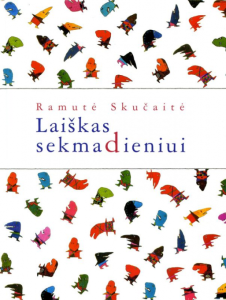The Letter to Sunday

Ramutė Skučaitė, Jūratė Račinskaitė. Laiškas sekmadieniui (The Letter to Sunday), Vilnius: Vaga, 1998. – 95 p.
“Man labai labai patinka, / Kai kas gero atsitinka” (“I like it more than I can say / When things like this just go my way”). This couplet from the poem Atvirai (Openly) is much loved by the poet herself as well as by many of her younger and older readers. The Letter to Sunday is probably the poet’s most recognized work. It was selected as the best children’s and young adult book of 1998 and won the UNESCO Award at the Leipzig Book Fair in 2000. The 55 poems/letters offer a quiet and personal communication with the reader. But defining the poems as letters only becomes meaningful and metaphorical when regarded in the context of the whole book, its design and illustrations. The 55 poems reveal the everyday world of a child, where the poet tries not to overstep the limits of a child’s understanding. The child’s world consists of small characters, small things, short moments. But the poet talks not only about a little stone, a little person, silver flowers and a trembling heart, but also about discovering the inner world which poetry is capable of opening up.
Ramutė Skučaitė (b. 1931) is known as a poet of children and childhood, the living legend of children’s literature. A true expert in verse and rhyme, she represents traditional poetry. Her aim is the clarity of words. Her poetry is musical. Her poems for both children and adults are widely sung. Ramutė is probably the only poet who writes utilitarian, or applied poetry: rhymed conundrums and riddles. She has written a great deal for adults and translated from other languages but the majority of her works are children’s books. Previously, she was convinced that she must switch gears in writing for children or writing for adults. Then she realized that poetry is poetry, and that true poets don’t write for their children or grandchildren but simply create a certain kind of poetry that is only slightly different from adult poetry. Ramutė’s mature poetry sees and shows the same issues for both adults and children, raising questions that are very similar: time, eternity, human existence, the co-existence of children and adults. She was awarded the Lithuanian National Prize “for uniting the worlds of young and grown-up people”.